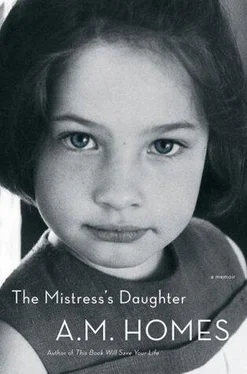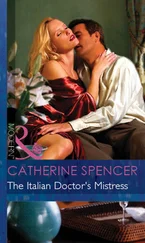Blindness — May 1993. The day my novel is published I accidentally poke the New York Times into my eye and shred my cornea. The pain is searing. I fumble for the eye doctor’s number and go rushing off to his office, returning hours later with what looks like a maxi pad taped over my face. There is a message from my publisher letting me know that my book has been reviewed that morning in the Washington Post , a message from my mother saying that she’s arranged for brownies and crudités to be served at my reading tomorrow in Washington, and a message from “the father.”
“It’s Norman,” he says, his voice wobbly, tentative, choking on itself. “I got your letter. Why don’t you give me a call when you have a moment.”
It’s been more than a month since I wrote him. If the review hadn’t appeared in the Post , would he have called? If I’d been flipping burgers in a McDonald’s instead of writing books, would I have ever heard from him?
“Well, what do you know?” he says, when I return the call. He’s a swaggering big shot, but there’s something to him, some half-a-heart that I instantly appreciate.
“Have you spoken to the Dragon Lady?” he asks, and I assume that he is talking about Ellen.
“She’s a little crazy.”
He laughs. “That’s the way she always was. That’s why I had to do what I did.”
Norman, a former football hero, a combat veteran, for some reason feels compelled to give me a pep talk. Fifty years after the fact, he quotes what Coach once told him about staying in the game, about not being a quitter. No one has ever spoken to me this way before; there’s something I like about it — it’s comforting, inspiring. He couldn’t be more different from the father I grew up with, an intellectual type. If I told Norman that I spent every Saturday of my childhood going to museums he wouldn’t know how to respond.
“I’ll be in Washington tomorrow for a couple of days on a book tour,” I say.
“Why don’t you meet me at my lawyer’s office and we can talk.”
I think of Ellen: I am not a slice of pie.
The next day I read in Washington; the bookstore is crowded with neighbors, relatives, my fourth-grade teacher, old friends from junior high, from early writing workshops. I haven’t had a chance to tell anyone about the eye injury in advance. When I get up to read, they’re shocked.
“It’s fine,” I say. “It’ll be okay in a couple of weeks.” I crack open the book. My field of vision is a circle about two inches wide. I hold the pages directly in front of my face. My good eye is half closed in sympathy with the injured one. I perform as much from memory as possible.
When the reading is finished, a long line forms, people wanting books signed, aspiring writers with questions. In the soft distance I see a stranger, a woman, standing nervously, twisting an umbrella around and around in her hands. Instinctively, I know it is Ellen. I continue signing books. The line begins to thin. Just as the last person is leaving, she steps up.
“What did you do to your eye?” she blurts in that rough voice.
“You’re not behaving,” I say. The store is packed with people who don’t know what ghost has risen up.
“You’re built just like your father,” she says.
Later, when I try to remember what she looked like, I have only a vague memory of green with white polka dots, brown hair piled high on her head. I remember seeing her arm and thinking how small her bones were.
In the distance another shadow emerges. My mother and a friend of hers are coming toward me. I imagine the two mothers meeting, colliding. This is something that can’t happen. It is entirely against the rules. No one person can have two mothers in the same room at the same time.
“There are people here whose privacy I have to protect,” I say to Ellen. She turns and runs out of the store.
“We spotted her during the reading,” my mother’s friend says.
“I knew who she was immediately,” my mother says. “Are you all right?” she asks — she seems shaken.
“Are you ?”
I’m scheduled to meet with a reporter after the reading. We sit in the basement of the bookstore, the reporter’s cassette recorder on a table between us.
“Is your book autobiographical?”
“It is the most autobiographical thing I have written, but no, it is not autobiographical.”
“But you are adopted?”
“Yes.”
“I heard something recently about you searching for your parents.”
“I have not searched for anyone.”
There is a pause. “Do you know who your parents are?” It seems like a strange question, like the kind of thing you’d ask someone who’d bumped their head against a wall and just regained consciousness.
In the morning, I take a taxi downtown. I am going to meet the father. I take a taxi because I am blind, because my mother is at work, because I can’t ask my father to drive me to meet my father. I am out of time, outside of myself. It feels like something from long ago when women didn’t drive. It is as though I am in a remake, a dramatic reenactment of a role originated by Ellen — the Visit to the Lawyer’s Office — the scene in which the pregnant woman goes to the lawyer’s office to find out what the big guy “might be able to do for her.”
At the lawyer’s office, I present myself to the receptionist. A man comes through the interior door. Is this the lawyer, my father, or just someone who works there? Anyone could be him, he could be anyone — this is what it’s like when you don’t know who you are.
I am reminded of the children’s book Are You My Mother? — in which a baby bird goes around asking various other animals and objects, “Are you my mother?”
“Are you Norman?”
“Yes,” he says, surprised that I don’t already know. He shakes my hand nervously and leads me into a large conference room. We sit on opposite sides of a wide table.
“My God,” he says, looking at me. “My God.”
“I cut my cornea,” I say, pointing to the patch on my eye.
“Reading a review of your book?”
“No, the obituaries,” I say honestly.
“Fine thing. Would you like a Pepsi?” On the table in front of him is a Pepsi bottle, sweating.
I shake my head.
The father is a big, pink-faced man, in a fancy suit, collar pin, tie. His hair is white, thin, slicked back.
We stare at each other across the table. “Fine thing,” he keeps saying. He is smiling. He has dimples.
Having grown up without the refracted reflections of biology, I have no idea whether he looks like me or not. I’ve brought my camera, a Polaroid.
“Do you mind if I take a picture of you?” I ask.
I take two and he just sits there flushed, embarrassed.
“Could I have one of you?” he asks and I allow him to take a picture.
It’s as though we’re making a perverse Polaroid commercial right there in the lawyer’s office — a reunion played out as a photo session. We come around the table and stand side by side, watching our images appear. It’s easier to really look at someone in a photograph than in real life — no discomfort at meeting the other person’s eye, no fear of being caught staring. Later, when I show friends the pictures, it is obvious to everyone that he’s my father—“Just look at the face, look at the hands, the ears, they’re the same as yours.”
Are they?
Norman hands me a copy of my book to sign. I autograph it for him and suddenly wonder what kind of a meeting we are having. I feel like a foreign diplomat exchanging official gifts.
“Tell me a little bit about you,” I say.
“I’m not circumcised.”
Okay, maybe it wasn’t the first thing he said, but it was certainly the second. “My grandmother was a strict Catholic, she had me baptized. I’m not circumcised.”
Читать дальше












